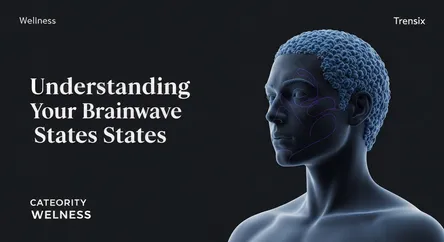Wellness
Understanding Your Brainwave States

Discover the five types of brainwave states and how you can influence them to reduce stress, improve focus, and enhance your overall well-being.
What is it?
Brainwave states are patterns of electrical activity occurring in the brain as neurons communicate. These synchronized electrical pulses, measured in frequencies (Hz), correspond to different states of consciousness and mental activity. There are five main types. Gamma waves (30-100 Hz) are associated with peak focus and problem-solving. Beta waves (12-30 Hz) are present during our normal waking state of alertness and active thinking. Alpha waves (8-12 Hz) signify a state of relaxed awareness, often occurring during meditation or daydreaming. Theta waves (4-8 Hz) are linked to deep relaxation, intuition, and light sleep. Finally, Delta waves (0.5-4 Hz) are the slowest and occur during deep, dreamless sleep, which is crucial for the body's restoration.
Why is it trending?
The growing interest in mindfulness and mental wellness has brought brainwave states into the spotlight. People are increasingly looking for ways to manage stress, enhance productivity, and improve their emotional well-being. Understanding brainwave states offers a scientific framework for these pursuits. The trend is fueled by the accessibility of tools and techniques like guided meditation, mindfulness exercises, and brainwave entrainment technologies such as binaural beats, which claim to help guide the brain into desired states like relaxation (alpha) or deep focus (beta). Wearable technology that provides neurofeedback is also becoming more mainstream, offering users real-time data on their mental state.
How does it affect people?
Each brainwave state directly impacts how we feel and perform. Being in a prolonged high-beta state can lead to feelings of anxiety and stress. By consciously practicing techniques like meditation or deep breathing, individuals can encourage a shift to alpha waves, promoting calmness and reducing stress. This shift can also enhance creativity and mental clarity. Harnessing specific brainwave states can lead to better sleep quality (delta), heightened intuition (theta), and improved learning and memory (alpha and theta). People can use this knowledge to intentionally select activities, such as listening to specific music or practicing mindfulness, to help them transition into a mental state best suited for a particular task, whether it's focused work or deep relaxation.